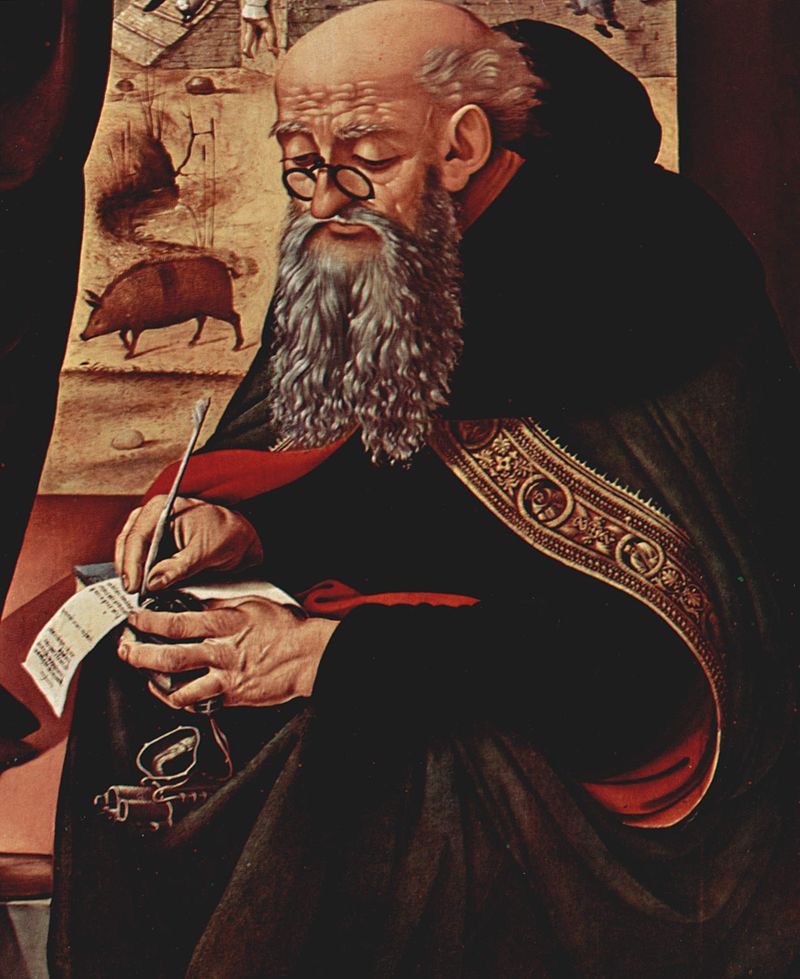Daily Office Readings for the feast day of Antony of Egypt
In our Gospel reading today, the story of Jesus’ encounter with a man who wants the “formula” for eternal life, illustrates that no matter how well we believe we can follow Jesus, there’s always something that will pull us up short in our human condition–reminding us that there is no formula, but it is by grace we are God’s own. Yet, at the same time, the process of learning to let go of one more thing, give up one more thing, change one more attitude, is part of how we begin to see that grace. The question is not “What do I have to do to get God to love me?”, but is one of “How do I learn to love God more?”
Learning what gets in the way of loving God more, is at the heart of asceticism–and Antony of Egypt (also known as Anthony of the Desert) is one of our earliest examples of a saint who accepted that challenge in a rather extreme way. In fact, it was Matthew’s version of today’s Gospel reading that provoked him to go into the desert wilderness.
Antony was not the first ascetic, nor was he the first hermit–but he might have been the first to purposefully go into desert wilderness to find God (around the year 270), and to garner enough attention to be recorded in early Christian history. Most of what we know about Antony was through a work written by Athanasius of Alexandria around 360–Antony was likely illiterate. Antony retreated to an old Roman fort until the year 305, and survived by food being thrown over the wall by pilgrims and friends–literally existing by God’s grace.
The ascetics are hard saints to read for so many of us in the 21st century. At one level, they can seem like they are after a form of “works righteousness”–that perhaps they also were seeking a formula to the Kingdom of Heaven. It’s a spiritual trap we can also fall into now and then during Lent, if we start treating our Lenten sacrifices like we are training to be the Airborne Rangers of spiritual practice. Yet to take that attitude about Antony and his ascetic peers misses a bigger picture. For starters, until the year 312, at Constantine’s conversion, early Christians were not free to explore following Jesus fully and publicly–to retreat to the desert offered relative safety. Solitude offered a freedom to ponder God, to speak aloud to God, to write about God if one was literate, or at least tell their stories to a literate person if they were not. (Although Antony did not read or write, he would dictate his thoughts to passing visitors on the other side of the fortress wall, and he would converse to them. He never welcomed visitors to his side of the wall, but he did speak to passersby if the mood hit him.)
At another level, ascetics like Antony are lenses into understanding a greater self-awareness of what truly does and does not hinder our willingness to love God. Through Antony’s willingness to choose a harder path than seems necessary, he learned a great deal about himself, namely, that he had a burning desire to love and follow Christ, and even though the relationship exists through grace, our efforts to experience that grace are equally necessary for us to feel the grace that is already there. We will always find something that is the impossible hurdle for us, and to know that God loves us despite that impossible hurdle can fill us with a peace we wouldn’t have known, had we not pressed ourselves to our limits.
One of the better known stories about him illustrates this. A passerby stopped by Antony’s desert home and asked him to pray for him. Antony’s response was, “I will have no mercy upon you, nor will God have any, if you yourself do not make an effort and if you do not pray to God.” It would have been easy for him to allow himself to be the visitor’s intercessor, to put himself in the position of the holy man with special connections to God–yet he did not. As harsh and jarring as Antony’s response might be, he displayed his own humility by pushing his visitor to take his own journey with God. Feeling God’s connection to us often is strongest when we allow ourselves to be vulnerable enough to both wail at God and rail at God.
Antony’s solitary decades are not unique to his time or place–we see it in our own American culture in both the African-American and Appalachian-American culture that created songs like “You gotta walk that lonesome valley”…
You got to walk that lonesome valley
You got to walk it by yourself
Nobody here can walk it for you
You got to walk it by yourself…
Eventually, Antony returned to community, agreeing to guide the group of monks that had moved in around him, following his lead. Yet he clearly returned to community changed in a positive way by his years of solitude. His life, extreme as it might seem by 21st century norms, serves as a reminder that solitude and overt purposeful challenges to our comfort zones have value in shaping community.
When was a time a journey through a lonesome valley gave you a bigger glimpse of a deeper life in Christ?
Image: Antony of Egypt, courtesy of Wikimedia Commons.
Maria Evans splits her week between being a pathologist and laboratory director in Kirksville, MO, and gratefully serving in the Episcopal Diocese of Missouri , as the Interim Pastor at Christ Episcopal Church, Rolla, MO.

